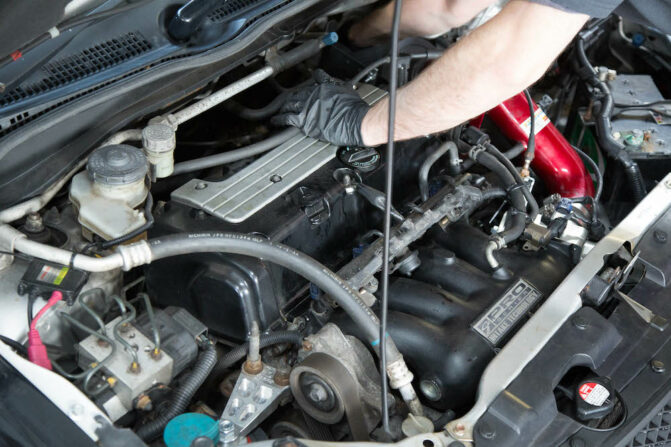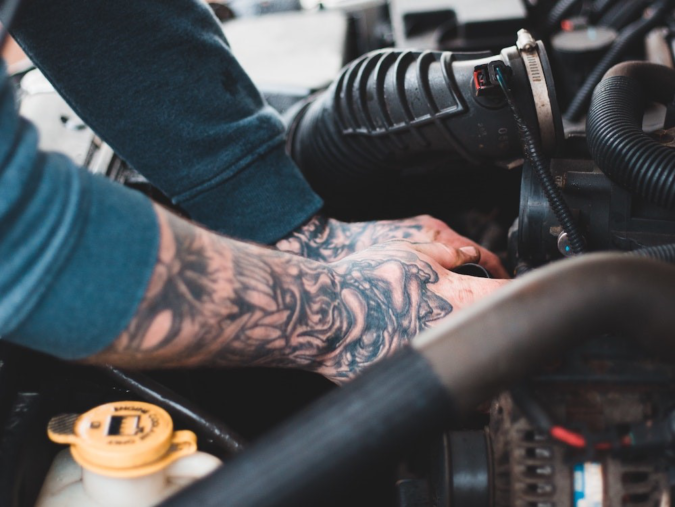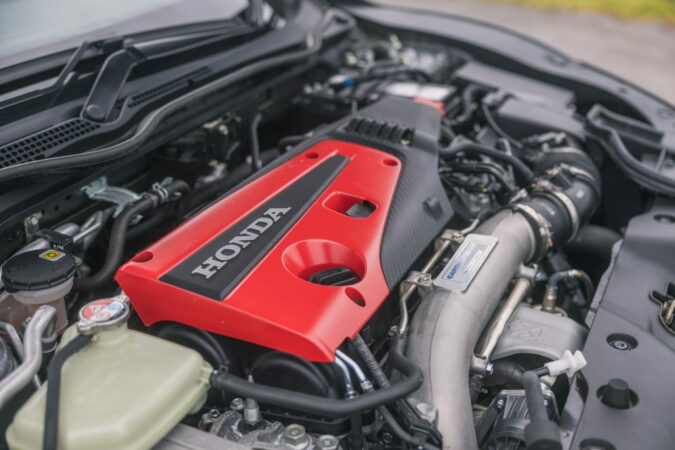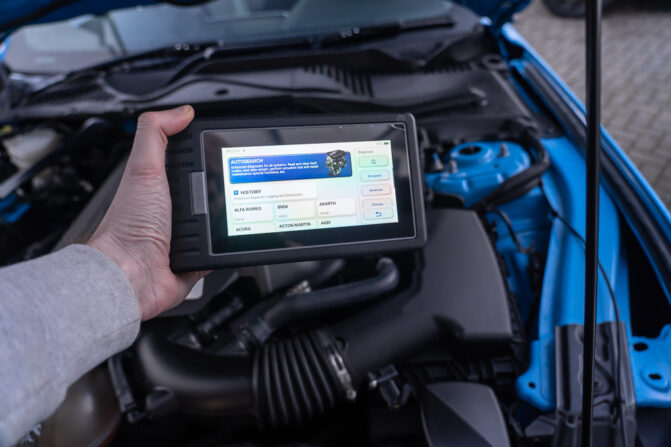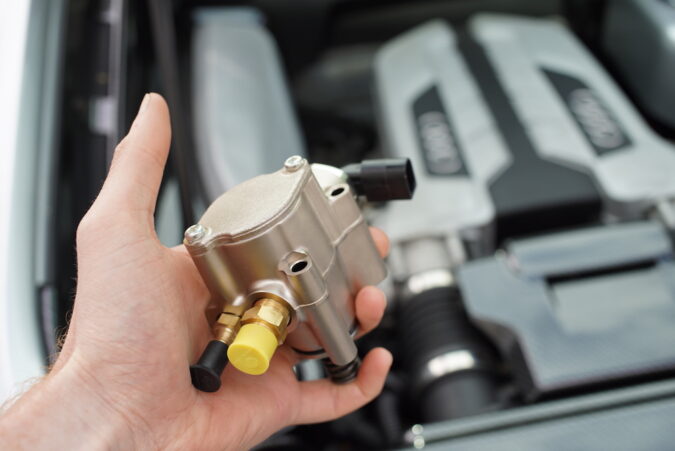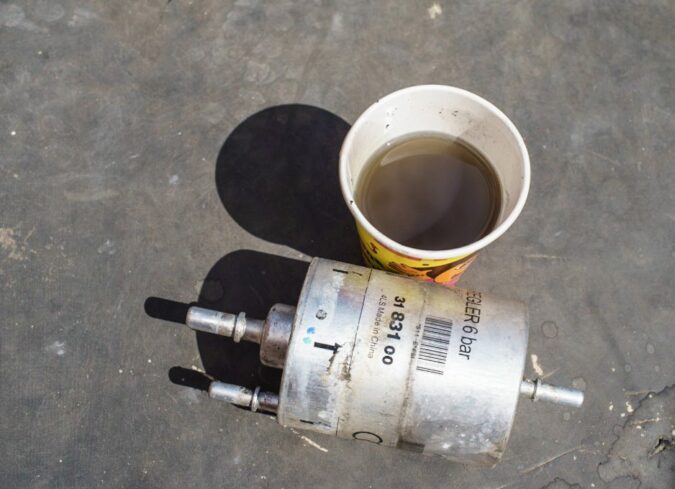To fix an issue where your car starts then dies immediately unless I give it gas you will need to identify the root of the problem. Even if it’s possible for you to fix it yourself, if you don’t know much about cars, it’s worth considering letting a qualified mechanic handle it.
- Idle Air Control Valve
- Faulty MAF Sensor
- Leaky Fuel Pump
- Engine Control Unit
- Frequently Asked Questions
Here are 12 typical issues you should investigate:
1. Idle Air Control Valve
The air control valve (IAC) manages the air-fuel ratio while your car is idling. It is attached to the throttle body, which is a component of the air intake system that regulates the air entering the engine (in response to your gas pedal input).
When your automobile is stationary, such as when the AC, headlights, or radio is turned on, the IAC also controls fluctuations in engine load.
Your automobile may not idle smoothly or it may fully stall if the air control valve malfunctions.
Bad Idle Air Control Valve Symptoms
It’s imperative to note any alarming symptoms your car starts exhibiting such as car starts then dies immediately unless I give it gas. Any modest changes in functionality or dependability should be addressed right away by an automotive shop that specializes in the make and model of the vehicle you drive.
A careful diagnosis is necessary before moving on since the symptoms of an idle air control valve failure can mimic those of other part problems. Some of the most typical signs of an air control valve failure are as follows:
Bad IAC Valve Symptoms #1: Check Engine Light
It’s crucial to have your check engine light inspected as soon as it illuminates. The great thing is that you can watch out for the check engine light might warn you of an issue with the air control valve, but it may also signal issues with other critical components of your vehicle.
Bad IAC Valve Symptoms #2: Recurrent Engine Stalling
The engine’s airflow is restricted when the IAC valve malfunctions. The engine stalls when the vehicle can’t get air. This symptom might range in severity from mild stalling at first to stalling right away after starting.
Bad IAC Valve Symptoms #3: Strange Idling Habits
It is common to suffer alarming symptoms while the automobile is idling since the IAC valve influences idle RPMs. While the automobile is idling, you might notice that the RPMs suddenly increase far more than usual, and it might generally act erratically.
Car Starts Then Dies Immediately Unless I Give It Gas – How To Fix Faulty IAC Valve
You can check to see if it prevents the car from dying by cleaning the IAC valve.
If that doesn’t work, there may be an electrical problem inside the valve that is keeping it from operating properly.
It’s preferable to leave such situations in the hands of a professional.
The wiring will be changed or fixed.
2. Vacuum Leaks
This occurs whenever there is a space in a vehicle’s air intake system that is behind the mass airflow sensor, or MAF sensor.
Due to this leak, the engine receives unmetered air, which alters the desired air-to-fuel ratio and makes the car run lean.
What does it mean to “run lean”?
If the fuel in your car’s ignition chamber ignites with either too much air or too little fuel, your engine runs lean.
While a small leak won’t stop your car from running, a significant one will cause the air-fuel ratio to become too lean and result in an engine stall.
Vacuum Leak Symptoms
Vacuum Leak Symptoms #1: Check Engine Light
When a vacuum leak is present in a car, truck, or utility vehicle, the main computer chip of the vehicle frequently activates the check engine light in addition to the problems described below.
Because the issues the vacuum leak is producing won’t stop until that point, the check engine light will stay on until the vacuum leak is remedied. An engine vacuum leak is one of the issues the check engine light, a general dashboard warning light, reports.
Vacuum Leak Symptoms #2: Engine Stalls Or Hesitates
If you notice that the car starts then dies immediately unless I give it gas, one cause could be that the engine is filling with air as a result of a vacuum leak, which causes hesitation and stalling circumstances. The air starts to deplete the engine’s fuel supply, which will lead to problems with engine performance.
When you step on the gas and when you are moving at a high speed, you might notice that your engine hesitates.
When you are at idle, the engine can stall. You won’t be able to resolve this problem until the vacuum leak is corrected.
Vacuum Leak Symptoms #3: Hissing Or Sucking Noises
And last, even a small engine vacuum leak can be heard. You will typically hear hissing noises coming from the engine when the leak isn’t too significant.
You may also describe it as whining noises. Whenever the vacuum leak becomes severe, it results in a suction-like sound similar to a vacuum cleaner.
Car Starts Then Dies Immediately Unless I Give It Gas – How To Fix Vacuum Leaks
To reach the engine compartment and look for a disconnected or ripped vacuum line, you can lift the car’s hood. However, the leaks will not always be obvious, so you’ll need assistance from a mechanic.
To pinpoint the precise location of the leak, a mechanic will do the smoke test, which involves pumping smoke into the intake system.
3. Anti-Theft System
When activated, an anti-theft device won’t supply any power to the fuel pump. But after turning the ignition key to the on position, the anti-theft system should turn off if you have the appropriate car keys (if you’ve lost them, you could figure out how to start a car without a key).
But if it stays on, the alarm can go off or your dashboard might reflect that it’s active. The outcome is that the car won’t start.
Car Starts Then Dies Immediately Unless I Give It Gas – How To Fix Anti-Theft System
A key symbol for your anti-theft alarm system should appear on your dashboard and disappear a few times after you start the vehicle. Try locking and then unlocking your car to try again if it doesn’t work.
If it still won’t go away, your car key or even the alarm may malfunction. Visit a mechanic with your vehicle to find out.
4. MAF Sensor
The mass airflow sensor, or MAF, is a sensitive device that monitors the amount of air that enters the engine of your car.
The sensor is easily contaminated by any dirt and oil buildup that is able to bypass the engine air filter.
Then, what happens?
A filthy MAF sensor may frequently read the wrong air pressure readings, messing up the air-fuel ratio and causing your car to stall.
Bad MAF Sensor Symptoms
Bad MAF Sensor Symptoms #1: Hesitation, Jerking Or Stalling While Accelerating
Untimed detonations might result from too much fuel remaining in the combustion chamber due to a malfunctioning MAF sensor.
This will manifest as poor maneuverability, such as hesitations or sharp jerks, especially when accelerating.
This could occur as you’re driving fast. These issues may cause hazardous situations that result in mishaps and injuries. You need to check your car as soon as possible if you experience any of these symptoms.
Bad MAF Sensor Symptoms #2: Is Too Rich In Air Fuel
Running rich refers to each combustion cylinder having an excessive amount of fuel and insufficient air. The following are indicators that your car is running rich:
- Dark smoke coming from the exhaust pipe
- Worse than typical fuel efficiency
- Erratic Idling
- Engine Check Light
These problems may arise if the MAF sensor is harmed or if the cables are covered in dirt. It can’t measure airflow precisely, thus it gives the PCM inaccurate data. The PCM discharges too much fuel when it overestimates airflow. Cleaning the wiring of the MAF sensor typically solves the issue.
Bad MAF Sensor Symptoms #3: The Air-To-Fuel Rate Is Too Lean
The opposite of running rich is “running lean,” which describes your car when each combustion chamber has too much air and too little fuel. The MAF sensor is providing erroneous data to the PCM, much like running rich. Instead of overestimating the airflow this time, understate it.
Car Starts Then Dies Immediately Unless I Give It Gas – How To Fix MAF Sensor
To resolve the problem, you can clean the sensor using a special MAF sensor cleaning. You might need to replace it if this doesn’t work.
Note: When cleaning, DO NOT physically touch or otherwise care for the mass airflow sensor. It is advised to leave it in the hands of the experts.
5. Ignition System
The internal combustion chamber’s fuel and air combination are ignited by a spark produced by the ignition system.
Your ignition system may now be experiencing a variety of problems. It might be:
- defective spark plug
- faulty automobile battery
- worn-out battery
- bad ignition switch
- worn ignition coil
Car Starts Then Dies Immediately Unless I Give It Gas – How To Fix Ignition System
Verify that the battery is properly wired and inspect the battery terminals for corrosion.
Try using a battery terminal cleaner to clean the terminals if you notice extensive corrosion.
Check each spark plug after that. It’s time for a replacement if the tip or electrode shows signs of excessive wear. You may check your spark plug for contamination with oil and petrol.
While you’re at it, check the ignition coil as well because a damaged one won’t give the plugs a steady spark.
Check the switch contacts on your ignition switch for damage and wear. You need a replacement if you see any damage.
6. Fueling System
The most frequent and obvious cause of a car starts then dies immediately unless I give it gas is an engine that is running low on fuel.
This occurs as a result of insufficient fuel in the fuel rail and a lack of fuel pressure to maintain engine life.
It’s not always your fault for failing to refuel. It might be a flawed:
- gas pump
- gasoline pump relay
- fuel injector sensor
- fuel pressure controller
Car Starts Then Dies Immediately Unless I Give It Gas – How To Fix Fueling System
Simply connect a fuel pressure gauge to the fuel rail to check for any fuel pressure to identify your lack of fuel issue.
Try not to try any other methods because you never know what can start a fire. Just call a mechanic instead.
7. Fuel Pump
A fuel pump is a straightforward machine that transports fuel from one place to another.
Internal combustion will have problems if there is a fuel pump leak. For ignition, the engine must always have the proper ratio of air to fuel.
The proper amount of fuel won’t reach the combustion chamber due to a fuel leak or a malfunctioning fuel pump.
Fuel Pump Leak Symptoms
Fuel Pump Leak Symptoms #1: Low Fuel Efficiency
Fewer miles per gallon is one sign of a gasoline pump that isn’t working properly. The efficiency and pressure of a gasoline pump are impacted by leaks or damage. The leak will stop enough gas from getting to your engine. Your engine runs inefficiently and burns more gasoline as a result of this lack of flow.
Other engine components may also be filled with gas, as we will cover in a moment.
Fuel Pump Leak Symptoms #2: Starter Problems
You should anticipate your car’s engine to start running very soon after turning the key or pressing the start button. You can have a fuel pump problem if the engine idles for a longer period of time than usual.
If you start to notice a delay when starting your car, have it checked by a qualified technician.
Fuel Pump Leak Symptoms #3: Lower Acceleration
Your fuel pump is calibrated to provide your engine with the appropriate amount of fuel when it is running or when the gas pedal is depressed. The pressure varies when a fuel pump leaks, which has an impact on your car’s acceleration. As a result, it takes longer to reach your desired pace.
Fuel Pump Leak Symptoms #4: Misfiring And Stalling
The gasoline system of your car is built to provide smooth and reliable operation of your car. Your engine may misfire and stall out for no apparent reason if your fuel pump is broken or leaking.
Stalls in an engine might be hazardous because you don’t anticipate losing power. Misfires manifest as a rough idle, which causes shaking and vibrations inside your car.
Car Starts Then Dies Immediately Unless I Give It Gas – How To Fix A Fuel Pump Leak
The majority of modern automobiles contain sensors that can identify fuel pumps or fuel system issues before they become more harmful. And the check engine light on the car will alert you if this occurs.
Get your automobile checked out by a mechanic if your check engine light is on. You probably need to replace it.
8. Fuel Injectors
The fuel injector is a mechanism that injects the ideal amount of fuel into the internal combustion chamber using a specific amount of pressure.
And using the sensor that is connected to the fuel injector, the engine control unit communicates with it.
The sensor now monitors the fuel injector pressure and sends data about it to the engine management unit. Your car then adjusts the pressure as necessary.
Your automobile might not start if the fuel injection system or sensor has a problem since there won’t be enough gasoline for adequate combustion.
In addition to problems with fuel delivery, clogged fuel injectors can also cause an automobile engine to stall.
Car Starts Then Dies Immediately Unless I Give It Gas – How To Fix Fuel Injectors
An easy method would be to turn the engine while feeling the fuel injectors with your palm to see if they click. If they don’t click, you must have at least one malfunctioning fuel injector. To resolve this problem, it is best to seek professional assistance.
You can buy an injector cleaner kit and do it yourself, though, if it’s clogged.
9. Carburetor
The carburetor is a crucial part of the internal combustion process of an older car that doesn’t use electronic fuel injection. This apparatus properly balances air and fuel for burning.
Your car will probably stall if the air and fuel ratio is off due to a bad carburetor (faulty, damaged, or dirty).
Bad Carburetor Symptoms
Bad Carburetor Symptoms #1: Engine Performance Decline
The engine performance loss is one of the first signs frequently linked to a damaged or failing carburetor. The primary element in charge of measuring and supplying the air-fuel mixture necessary for the engine to run is the carburetor.
Therefore, it might throw off this mixture and damage engine performance if it develops any kind of problem. A damaged carburetor may cause an engine to accelerate slowly and to lose power and fuel efficiency noticeably.
Bad Carburetor Symptoms #2: Exhaust Black Smoke
Black smoke rising from the exhaust is another sign that the carburetor is malfunctioning. If there is black smoke emerging from the exhaust, the engine is running too richly or is consuming too much fuel.
In addition to burning unnecessary fuel, a carburetor that receives excessive fuel to the point of producing black smoke also generates excessive emissions.
Bad Carburetor Symptoms #3: Overheating Or Backfiring
Other typical indications of a carburetor issue include engine backfiring and overheating. The engine may backfire or overheat if the carburetor has a problem that causes it to provide a lean mixture or a mixture with insufficient gasoline.
Lean mixtures not only lead to backfire and overheating but also poor engine performance and, in more extreme circumstances, engine damage.
Car Starts Then Dies Immediately Unless I Give It Gas – How To Fix Bad Carburetor
You can attempt to rebuild it using a kit, clean it with a carb cleaner, or swap it out for a new carburetor.
10. Engine Control Unit
The computer that controls the primary engine parameters and programming for your vehicle is the engine control unit (ECU) or engine control module (ECM).
Although problems with this control unit are rather uncommon, if they do arise, they may be one of the many causes of your car’s intermittent starting.
Car Starts Then Dies Immediately Unless I Give It Gas – How To Fix A Bad ECU
Because an ECU failure typically indicates that multiple electrical systems are malfunctioning, get in touch with a specialist.
11. EGR Valve
Exhaust Gas Recirculation, or EGR, is a valve that regulates how much exhaust goes back to the combustion chamber according to the engine load.
This valve assists in lowering combustion temperatures, which in turn lowers nitrogen oxide emissions and lessens pollution.
If the EGR valve remains or sticks open, too much air may enter the intake manifold, leading to an excessively lean air-fuel combination. As a result, the car will start before immediately dying.
Car Starts Then Dies Immediately Unless I Give It Gas – How To Fix An EGR Valve
First, try cleaning it by taking the EGR valve off. Scrub away with a wire brush after giving it a carb cleaner spray. You won’t need a replacement if this works!
12. Fuel Filter
In the vicinity of the fuel line is a fuel filter that removes rust and debris from the fuel as it travels through before it reaches the engine. Internal combustion engines tend to contain them the most.
Additionally, because it filters the fuel, it is expected that it would ultimately become clogged and may require cleaning or replacement.
The fact is that if it’s old or clogged, it can cause your car to stall.
Car Starts Then Dies Immediately Unless I Give It Gas – How To Fix A Clogged Fuel Filter
You may look up the recommended timing for replacing the gasoline filter in your owner’s manual for your car. The usual recommendation is every five years or 50,000 miles.
However, how well your filter is working will determine this. Additionally, your mechanic will typically advise cleaning or replacing every 10,000 miles.
Frequently Asked Questions
What Sensors Can Cause A Car Not To Start
The camshaft sensor, crankshaft sensor, mass air flow (MAF) sensor, manifold absolute pressure (MAP) sensor, and throttle position sensor are the most typical sensors that prevent your automobile from starting.
What Would Cause A Car To Shut Off While Driving
In order to recharge the battery, the alternator assists in controlling the flow of electricity. Your automobile will cut off while you’re driving if the alternator is damaged. The power supply is where this primarily occurs. Engine power loss will result from alternator problems.
Why Does My Car Turn Off When I Stop
The converter won’t function properly if the torque converter is damaged or if the transmission fluid level is low; as a result, the vehicle won’t be able to sustain power at low speeds, which results in the engine cutting out. This problem can also be brought on by a broken torque converter solenoid or TCS.

